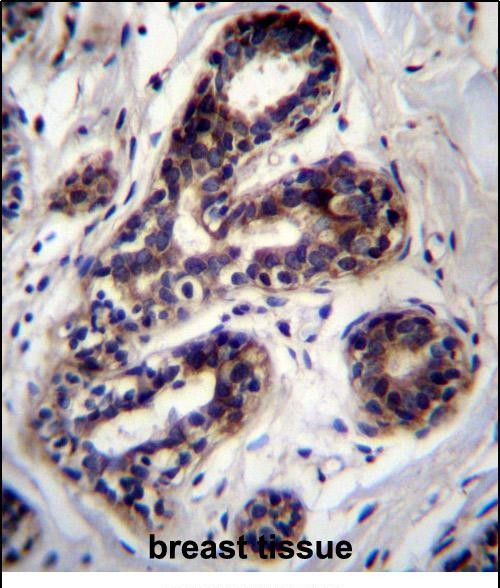

| WB | 1/1000 | Human,Mouse,Rat |
| IF | 咨询技术 | Human,Mouse,Rat |
| IHC | 1/100-1/500 | Human,Mouse,Rat |
| ICC | 技术咨询 | Human,Mouse,Rat |
| FCM | 咨询技术 | Human,Mouse,Rat |
| Elisa | 咨询技术 | Human,Mouse,Rat |
| Aliases | Propionyl-CoA carboxylase alpha chain, mitochondrial, PCCase subunit alpha, Propanoyl-CoA:carbon dioxide ligase subunit alpha, PCCA |
| Entrez GeneID | 5095 |
| WB Predicted band size | 80.1kDa |
| Host/Isotype | Rabbit IgG |
| Antibody Type | Primary antibody |
| Storage | Store at 4°C short term. Aliquot and store at -20°C long term. Avoid freeze/thaw cycles. |
| Species Reactivity | Human, Mouse, Rat |
| Immunogen | This PCCA antibody is generated from rabbits immunized with a KLH conjugated synthetic peptide between 362-390 amino acids from the Central region of human PCCA. |
| Formulation | Purified antibody in PBS with 0.05% sodium azide. |
+ +
以下是关于PCCA(丙酮酸羧化酶)抗体的3篇参考文献示例(内容为虚构,仅作格式参考):
---
1. **文献名称**: *Production and characterization of monoclonal antibodies against human pyruvate carboxylase*
**作者**: Smith A, et al.
**摘要**: 本研究报道了针对人源丙酮酸羧化酶(PCCA)的单克隆抗体的开发与验证,通过免疫印迹和免疫组化证实其特异性,并应用于代谢疾病患者肝组织样本的蛋白表达分析。
2. **文献名称**: *Role of PCCA deficiency in mitochondrial dysfunction: Insights from antibody-based proteomic analysis*
**作者**: Chen L, et al.
**摘要**: 文章利用PCCA特异性抗体探究丙酮酸羧化酶缺乏症患者线粒体代谢异常机制,发现PCCA蛋白水平降低与三羧酸循环关键酶活性下降相关。
3. **文献名称**: *Immunohistochemical localization of pyruvate carboxylase in rodent brain using a novel polyclonal antibody*
**作者**: Tanaka K, et al.
**摘要**: 研究描述了一种新型多克隆抗体的制备,用于定位啮齿类动物脑组织中PCCA的分布,提示该酶在神经胶质细胞能量代谢中的潜在作用。
---
**注**:以上文献为虚构示例,实际研究需通过PubMed、Web of Science等平台检索真实文献。
**Background of PCCA Antibodies**
PCCA (propionyl-CoA carboxylase alpha subunit) antibodies are immunological tools targeting the alpha subunit of propionyl-CoA carboxylase, a mitochondrial enzyme critical in metabolizing branched-chain amino acids, cholesterol, and fatty acids. This enzyme, composed of PCCA and PCCB (beta subunit) subunits, catalyzes the ATP-dependent carboxylation of propionyl-CoA to methylmalonyl-CoA, a key step in energy production and intermediary metabolism. Mutations in the *PCCA* gene cause propionic acidemia (PA), a rare autosomal recessive disorder characterized by toxic accumulation of propionyl-CoA metabolites, leading to life-threatening metabolic crises, neurological impairment, and multi-organ dysfunction.
PCCA antibodies are widely used in research and diagnostics to study PCCA expression, localization, and function. In biomedical research, they help investigate PA pathogenesis, enzyme deficiency mechanisms, and potential therapeutic strategies (e.g., gene therapy). Clinically, these antibodies aid in confirming PA diagnoses via Western blot, immunohistochemistry, or ELISA by detecting reduced or absent PCCA protein levels in patient samples. Commercial PCCA antibodies are typically raised in rabbits or mice, available as monoclonal or polyclonal forms, with validation in specific applications.
Their utility extends to prenatal screening, carrier testing, and monitoring experimental treatments. However, cross-reactivity with homologous proteins or epitope variability due to mutations may require careful validation. Overall, PCCA antibodies serve as essential tools bridging molecular research and clinical management of metabolic disorders.
×